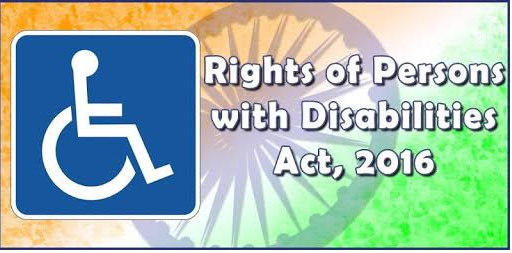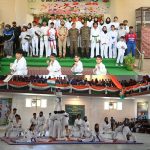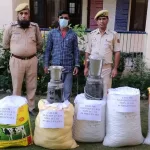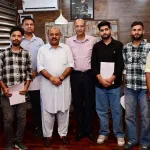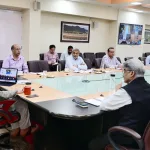RIGHTS WITHOUT REACH
In year 2016, the Indian Parliament enacted the Rights of Persons with Disabilities (RPWD) Act, a landmark legislation aimed at upholding the dignity, autonomy, and equal rights of persons with disabilities (PwDs). In Jammu and Kashmir, the population of PwDs is steadily increasing, underscoring the urgent need for effective policies and inclusive development.
While the enactment of the RPWD Act marked a significant milestone in India’s commitment to ensuring equal rights and opportunities for PwDs, the situation on the ground in Jammu and Kashmir tells a different story. The implementation of the Act has faced numerous challenges, with many of its promises remaining unfulfilled. Systemic barriers, administrative inertia, and deep-rooted societal stigma continue to obstruct the realization of the rights guaranteed under the Act.
Implementation Gaps: Law vs. Reality
The RPWD Act, 2016, identifies 21 categories of disabilities and mandates state governments to ensure their rights through access to infrastructure, education, employment, social security, and healthcare. Importantly, it aligns with the United Nations Convention on the Rights of Persons with Disabilities (UNCRPD), to which India is a signatory. In theory, the Act recognizes disability as a human rights issue and not just a matter of charity or welfare. In practice, however, particularly in J&K, the state apparatus has been sluggish in translating legal commitments into action.
Under sub-section (1) of Section 79 of the Rights of Persons with Disabilities (RPWD) Act, 2016, the Government of Jammu and Kashmir appointed Iqbal Lone as the State Commissioner for Persons with Disabilities in September 2022, for a tenure of three years. This marks his second term serving in this capacity in the Union Territory. Although the RPWD Act has been officially adopted in J&K, its implementation remains largely symbolic. The legislation, while seemingly robust on paper, lacks meaningful enforcement on the ground.
Despite the formal structures in place—including the appointment of a disability commissioner and the presence of a comprehensive legal mandate—persons with disabilities in the region continue to be deprived of their most essential rights like barrier-free infrastructure, inclusive education, livelihood opportunities, vocational training and adequate healthcare. The chasm between policy formulation and on-the-ground action is glaring, leaving the disabled community sidelined, systematically ignored, and persistently voiceless.
Voices from the Ground: Activists Speak Out
Javed Ahmed Tak, a prominent disability rights activist and Padma Shri awardee, has raised serious concerns regarding the implementation of the Rights of Persons with Disabilities (RPWD) Act, 2016 in Jammu and Kashmir. According to Javed, although the RPWD Act has been officially extended to the Union Territory following the abrogation of Article 370 and 35A through the Jammu and Kashmir Reorganization Act, its enforcement remains superficial. While the Act is legally in place, critical administrative mechanisms such as the State Advisory Board and District-Level Committees for Persons with Disabilities have yet to be constituted, even several years after the Act’s adoption.
Tak further pointed out that despite the legal mandate, the reservation in promotion for employees with disabilities has not been implemented, and the identification of suitable posts for persons with disabilities has not been aligned with the Central Job Identification List. Moreover, recruiting agencies and government departments have failed to maintain mandatory registers for the carry-forward and backlog of vacancies reserved for persons with disabilities. This lack of compliance has led to continued exclusion of persons with disabilities from equitable employment opportunities, in direct violation of the rights guaranteed under the RPWD Act.
Umesh Sharma, another prominent disability rights activist from Jammu, emphasized that under Section 24 of the Rights of Persons with Disabilities (RPWD) Act, 2016, the government is mandated—within the limits of its economic capacity—to provide financial assistance to persons with disabilities 25% higher than other social security schemes. However, in the Union Territory, the government is currently providing only Rs 1,250, to all beneficiaries which fall short of the mandated amount.
Despite this clear legal obligation, Sharma asserted that the government has consistently failed to deliver the promised support. He also highlighted Section 86 of the Act, which calls for the establishment of a Union Territory Fund for Persons with Disabilities. Yet, no tangible progress has been made in operationalizing this fund. He further revealed that he had formally written to higher authorities and the state Disability Commissioner, urging the immediate implementation of the 25% enhanced financial assistance provision and the constitution of an advisory committee to assist the Disability Commissioner, as stipulated under the Act. However, his appeal remains unanswered, reflecting a troubling disregard for the rights and welfare of persons with disabilities.
Accessibility: The First Barrier
Accessibility is the foundation of dignity and autonomy for persons with disabilities (PwDs). It is what enables them to participate fully in education, employment, civic life, and social engagement. The Rights of Persons with Disabilities (RPWD) Act, 2016, under section 40 mandates barrier-free access to public buildings, transport systems, and information and communication technologies. Yet in Jammu & Kashmir, even key government institutions—such as the Social Welfare Department, High Court, public schools, parks and hospitals—fail to meet even the most basic accessibility standards.
Despite the targets set under the Accessible India Campaign (Sugamya Bharat Abhiyan), the majority of public spaces across Kashmir remain hostile to people with disabilities. Sidewalks are uneven or non-existent; ATMs, police stations, post offices, schools and bus terminals often lack ramps, tactile pathways, elevators, or even accessible toilets.
Moreover, digital accessibility is virtually absent. Most government websites and online services are not designed with universal access in mind, excluding PwDs from essential digital platforms and e-governance services. This digital divide further isolates an already marginalized community, reinforcing the sense that their needs are invisible to those in power.
Inclusive Education: A Distant Dream
Section 16 of the Rights of Persons with Disabilities (RPWD) Act, 2016, guarantees the right to inclusive education. It places a legal obligation on both government and private educational institutions to adapt curricula, train teachers, and provide necessary support including assistive devices and learning aids to enable children with special needs (Cwsn) to learn in mainstream classrooms without discrimination.
However, in Jammu and Kashmir, inclusive education remains more a policy ideal than a practiced reality, especially in private as well as government-run schools. Most schools lack qualified special educators, trained counselors, Rehab Therapists, accessibility and access to Braille books, sign language interpreters, or assistive technologies such as screen readers or learning software. The situation is far worse in rural and remote districts, where children with disabilities are often either kept at home due to inaccessibility or are enrolled in schools that lack the basic infrastructure or human resources to support them.
Parents are frequently confronted with a heartbreaking choice accept inadequate and discriminatory education in mainstream schools, or send their child to special schools NGOs, which are few in number, poorly resourced, and often geographically or financially inaccessible. Adding to these systemic barriers is the entrenched societal stigma surrounding disability.
Teachers and school administrators, largely untrained in disability awareness or inclusive education, may unintentionally marginalize or isolate students with disabilities. This results in low self-esteem, poor academic performance, and high dropout rates among children with special needs undermining not just the letter of the law, but the very spirit of equality, dignity, and inclusion that the RPWD Act was designed to uphold.
Vocational Training and Employment: A Broken Bridge
The Rights of Persons with Disabilities (RPWD) Act, 2016, under Section 19, emphasizes the importance of vocational training for the economic empowerment of persons with disabilities (PwDs). It also mandates 4% reservation in government jobs for individuals with benchmark disabilities. However, in Jammu and Kashmir, these provisions remain largely unimplemented and ineffective.
For many children with disabilities who cross the age of 18, vocational training opportunities are virtually non-existent. With no access to skill development programs or career counseling, these young adults are often confined to their homes, stripped of the chance to gain independence or earn a livelihood.
There is a severe shortage of vocational training centers specifically designed to accommodate the diverse needs of PwDs. In the few centers that do exist, infrastructure is inadequate, funding is insufficient, and there is a lack of trained instructors with the expertise to work with various forms of disability. These gaps render such institutions ineffective and inaccessible to those who need them most.
On the employment front, the situation is equally bleak. Government departments in J&K have shown poor compliance with the mandatory job reservation quotas. The private sector, which remains largely unregulated in terms of inclusive hiring, demonstrates even less willingness to accommodate disabled individuals in the workforce.
This persistent underemployment and exclusion not only violate the legal guarantees provided by the RPWD Act but also trap persons with disabilities in cycles of poverty, dependency, and social isolation. Without access to skills and jobs, the disabled population in J&K continues to be denied their right to live with dignity and economic self-reliance.
Health Care: Inaccessible and Inadequate
Section 24 of the Rights of Persons with Disabilities (RPWD) Act, 2016, guarantees the right to accessible, non-discriminatory, and affordable healthcare for persons with disabilities. The law mandates that government health facilities provide free healthcare, including diagnostic, preventive, and rehabilitative services. However, in Jammu and Kashmir, the ground reality tells a very different story—one marked by systemic neglect, infrastructural inaccessibility, and a lack of disability-sensitive services.
Across the Union Territory, children with special needs (CWSN) are facing immense challenges due to the absence of rehabilitation and early intervention centers in government hospitals, particularly at the district level. These children, who require timely therapies, medical interventions, and developmental support, are often left without proper care, causing irreversible setbacks in their growth and well-being.
Primary Health Centres (PHCs) and district hospitals are rarely equipped with wheelchair-accessible entry points, disability-friendly toilets, or basic assistive infrastructure. The absence of sensory-friendly environments, Rehab therapists and specialized pediatric therapists makes these facilities inaccessible and unwelcoming for persons with disabilities.
Furthermore, critical services such as speech therapy, occupational therapy, physiotherapy, and mental health counseling are either non-existent, poorly staffed, or unaffordable. Families are often forced to travel to major cities like Srinagar or Jammu or outside state if they can afford it just to access basic rehabilitative care, leaving those in remote or economically weaker regions completely neglected.
The lack of inclusive health infrastructure and trained medical personnel not only violates the provisions of the RPWD Act but also reflects a wider failure of public health policy to prioritize the needs of persons with disabilities. Without urgent reforms and investment, healthcare in J&K will continue to fail the very people it is meant to protect.
The Way Forward: From Policy to Practice
To bridge the gap between rights and reality, J&K must adopt a multipronged approach:
- Accessibility Audits and Retrofitting: All public infrastructures must undergo accessibility audits, followed by time-bound retrofitting under professional guidance. Government buildings, schools, Public transport must be redesigned to cater to the needs of all users, not just the able-bodied.
- Inclusive Education Reform: Every government as well as private schools must have trained special educators, accessible teaching materials, and an inclusive environment. Teacher training institutes must include disability modules in their curriculum. Government must monitor compliance with inclusive education standards at the school level.
- Strengthening Vocational Training: Skill development programs must be redesigned to accommodate the needs of PwDs, with targeted outreach, customized curricula, and trained instructors. Public-private partnerships should be incentivized to promote inclusive hiring and entrepreneurship for disabled individuals.
- Healthcare Accessibility: Every district hospital should have a disability desk with trained staff. Government health schemes must include free or subsidized mobility aids, hearing aids, prosthetics, and therapy services. Outreach health camps for PwDs in rural areas can bring services closer to that in need.
- Data and Accountability: Reliable data on disability demographics, education, employment, and health outcomes must be collected and published regularly. A state disability commissioner must be empowered with enforcement powers and supported by adequate staff and resources.
- Sensitization Campaigns: Awareness campaigns targeting both government staff and the general public are essential to dismantle stigma and promote the social inclusion of persons with disabilities.
Conclusion
The Rights of Persons with Disabilities (RPWD) Act, 2016, guarantees a comprehensive and progressive set of rights for individuals with disabilities. However, in Jammu and Kashmir, these rights often remain inaccessible in daily life. The glaring disconnects between legislative intent and on-the-ground realities continue to relegate persons with disabilities to the status of second-class citizens. A truly rights-based approach requires more than forward-looking laws—it demands robust implementation, institutional accountability, and a fundamental shift in societal attitudes.
We hope that the newly formed government in the Union Territory of Jammu and Kashmir will take urgent and concrete steps to ensure the full and effective implementation of the RPWD Act, 2016, and to initiate long-overdue reforms in the disability sector. Notably, the current Disability Commissioner’s three-year tenure is set to expire in September 2025. It is imperative that the government promptly issues a notification for the appointment of a dedicated Disability Commissioner and establishes a comprehensive roadmap for inclusive and rights-based governance.
Until these foundational measures are undertaken, the rights of persons with disabilities in Jammu and Kashmir will remain largely aspirational—progressive in principle, but unfulfilled in practice.
(Author is Sr. Pediatric Rehab Therapist & Social Worker (MSW) Working for Disability & Child Rights. Feedback: [email protected])


